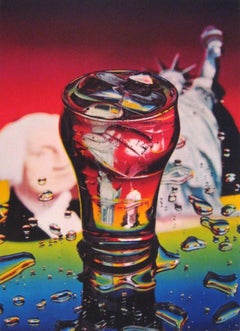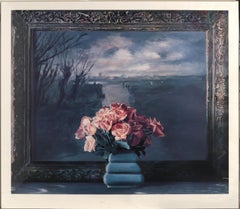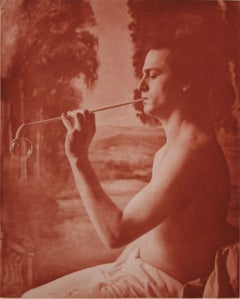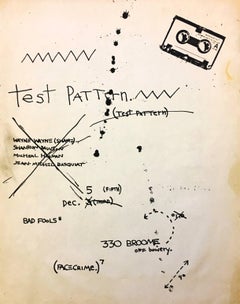Yankee Flame Pop Art photorealist Lt Ed Signed/N. Statue of Liberty US President
Ben Schonzeit
Yankee Flame, from the portfolio: America: the Third Century, 1975
Collotype on wove paper
Pencil signed and numbered 50/200 on the front
Publisher: APC Editions, Chermayeff & Geismar Associates, Inc
Printer: Triton Press
27 × 19 3/10 inches
Unframed
Note: this is the original hand signed and numbered collotype; not to be confused with the separate (unsigned) poster edition.
This hand-signed, numbered and dated collotype in colors by photorealist pioneer artist Ben Schonzeit was created in 1975 for the portfolio America: the Third Century, commissioned by Mobil Oil Corporation in which 13 American artists, including Roy Lichtenstein, Ed Ruscha, Robert Rauschenberg, James Rosenquist and others created works celebrating America's bicentennial. Yankee Flame combines the iconic images of George Washington, Coca-Cola and the Statue of Liberty into a collaged interpretation of contemporary American life and the meaning of freedom. "Yankee Flame" is in excellent condition and never framed. It was acquired as part of the America: The Third Century full portfolio.
Ben Schonzeit (b. 1942, Brooklyn, New York) is one of the original Photorealist painters and is considered to have pioneered the airbrush technique. His works often depict still life arrangements that are intentionally out of focus. He received his B.F.A. from The Cooper Union in 1964 and has since had over 50 solo exhibitions both in the United States and abroad. His paintings are held in numerous museum collections including the Solomon R. Guggenheim Museum in New York, Virginia Museum of Fine Arts in Richmond, Virginia, and the Metropolitan Museum of Art in New York.
In 1973 Nancy Hoffman introduced me to Ben Schonzeit in the backroom of her gallery on West Broadway. She had been open less than a year, and Ben was one of the artists in her original stable. His large Crab Blue It had arrived from his studio a few days earlier and was leaning against the wall. I thought at the time it was one of the most impressive, virtuosic Photorealist works I had seen. That first encounter was more than a quarter of a century ago and I have always considered it to be one of the quintessential, tour de force paintings of American Photorealism. In the early seventies one could stand on West Broadway on any pleasant, sunny weekday and see less than a dozen people on the street between the Nancy Hoffman Gallery and OK Harris Works of Art. Almost all of the SoHo galleries, such as Leo Castelli, Paula Cooper, Ward-Nasse, and Ivan Karp’s Hundred Acres, could be visited in an afternoon. At night the streets were almost deserted. With the exception of Andy Warhol, there were no art world superstars. More importantly, none of the artists expected to achieve celebrity status. That was a phenomenon of the eighties and nineties. There were a only a handful of restaurants and watering holes, such Elephant and Castle, Fanelli’s, the Spring Street Bar and Prince Street Bar. Fanelli’s closed on weekends, which was a holdover from their sweatshop clientele during lunch and ragtag group of artists in the evenings. In those early days of SoHo, the drafty, raw sweatshop spaces with their large windows, rough floors, and service elevators provided large, inexpensive living quarters and studios for many artists. Unlike today, there were no boutiques. The area was not chic and with the exception of Lowell Nesbett’s showplace, the lofts were not glamorous. Schonzeit was in the same living and working space the he now occupies when I first visited him, but SoHo was a very different time and place. When the National Endowment of the Arts recommended me to curate America 1976, which turned into one of the major visual arts projects for the Bicentennial, Ben Schonzeit was on the first list of participants I made up for the U.S. Department of the Interior. His large diptych, Continental Divide, was one of the most memorable works produced for the exhibit. I stopped by his studio four or five times while it was in progress and have visited him many times over the years. We have maintained a very cordial working relationship and friendship over the past three decades. I saw The Music Room exhibit in 1978 and realized at the time that the vigorously rendered mural sized canvases and mirror and related works represented a major catharsis in his painting. In many ways, it and the other paintings and drawings based on the same image represented a sharp, decisive break with the tenets of Photorealism, or at least the photo-replicative aspects that had been so widely heralded in America and abroad in the mid-seventies. Over the years we have continued to work together. He has been in almost all of the major exhibitions I have curated here and abroad and in almost all of the books I have written. I am familiar with his studio habits, his quiet, internalized restlessness that manifests itself in the hundreds of small, unknown drawings and watercolors, doodles on napkins during lunch, and imaginary landscapes. I also know that he would rather do a painting than think or talk about it. Over the years I have followed the shifts in his studio procedure from the monumental airbrushed fruit and vegetable paintings to the most recent bouquets of flowers and decorative paintings. Our discussions of these matters tends to lapse into a verbal shorthand at this point. The following essay is based on both my longstanding familiarity and admiration for his work and involvement with contemporary realism and figurative painting. A booklet of color xeroxes with notes made up by Schonzeit was extremely helpful. In addition to several interviews, much of the information unfolded through a lengthy series of Emails. Due to our different working habits these were composed and sent out very late at night and answered by Ben the following morning. They dealt with the specifics of many of the paintings, generalities, his background and childhood in Brooklyn, and occasional bits of art world gossip. And there were odd discoveries. Prior to discussing his witty, tongue in cheek painting of Buffalo Bill, I did not know or had long forgotten that
William Cody...



